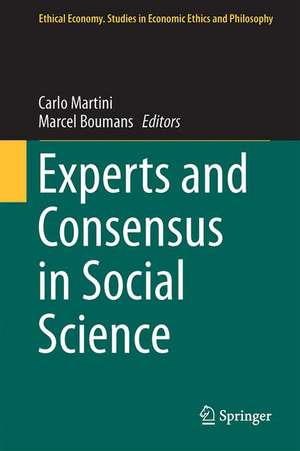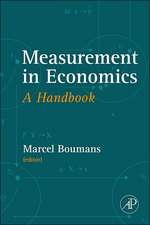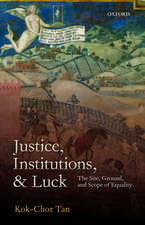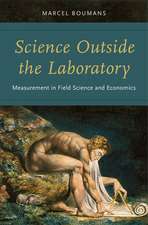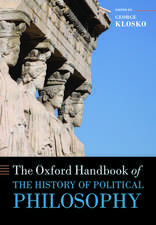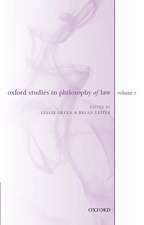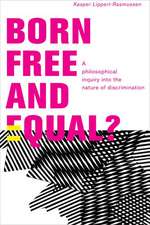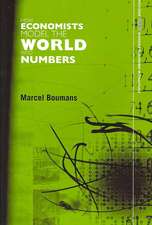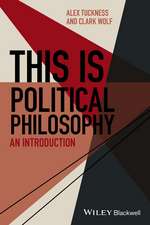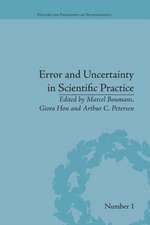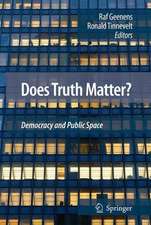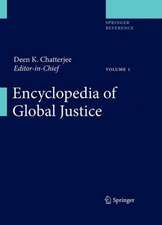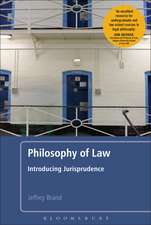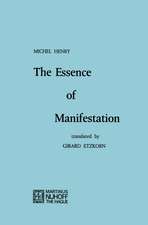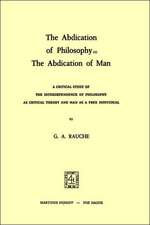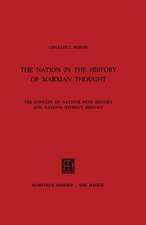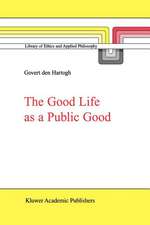Experts and Consensus in Social Science: Ethical Economy, cartea 50
Editat de Carlo Martini, Marcel Boumansen Limba Engleză Hardback – 24 sep 2014
| Toate formatele și edițiile | Preț | Express |
|---|---|---|
| Paperback (1) | 562.55 lei 38-44 zile | |
| Springer International Publishing – 22 sep 2016 | 562.55 lei 38-44 zile | |
| Hardback (1) | 573.52 lei 38-44 zile | |
| Springer International Publishing – 24 sep 2014 | 573.52 lei 38-44 zile |
Din seria Ethical Economy
- 18%
 Preț: 788.72 lei
Preț: 788.72 lei -
 Preț: 280.54 lei
Preț: 280.54 lei - 18%
 Preț: 1007.35 lei
Preț: 1007.35 lei - 18%
 Preț: 892.90 lei
Preț: 892.90 lei - 18%
 Preț: 782.42 lei
Preț: 782.42 lei -
 Preț: 497.00 lei
Preț: 497.00 lei - 15%
 Preț: 644.95 lei
Preț: 644.95 lei -
 Preț: 387.38 lei
Preț: 387.38 lei -
 Preț: 486.42 lei
Preț: 486.42 lei - 18%
 Preț: 948.79 lei
Preț: 948.79 lei - 18%
 Preț: 958.38 lei
Preț: 958.38 lei - 15%
 Preț: 634.18 lei
Preț: 634.18 lei - 15%
 Preț: 639.59 lei
Preț: 639.59 lei - 18%
 Preț: 942.94 lei
Preț: 942.94 lei - 15%
 Preț: 635.31 lei
Preț: 635.31 lei - 18%
 Preț: 949.42 lei
Preț: 949.42 lei - 15%
 Preț: 635.15 lei
Preț: 635.15 lei - 15%
 Preț: 635.47 lei
Preț: 635.47 lei - 18%
 Preț: 893.84 lei
Preț: 893.84 lei - 18%
 Preț: 948.92 lei
Preț: 948.92 lei -
 Preț: 391.61 lei
Preț: 391.61 lei - 18%
 Preț: 948.61 lei
Preț: 948.61 lei - 18%
 Preț: 1232.09 lei
Preț: 1232.09 lei - 18%
 Preț: 951.91 lei
Preț: 951.91 lei - 18%
 Preț: 1226.11 lei
Preț: 1226.11 lei - 18%
 Preț: 936.93 lei
Preț: 936.93 lei - 15%
 Preț: 641.53 lei
Preț: 641.53 lei - 18%
 Preț: 953.35 lei
Preț: 953.35 lei - 15%
 Preț: 635.96 lei
Preț: 635.96 lei - 18%
 Preț: 958.38 lei
Preț: 958.38 lei - 15%
 Preț: 632.55 lei
Preț: 632.55 lei - 15%
 Preț: 641.20 lei
Preț: 641.20 lei - 15%
 Preț: 633.53 lei
Preț: 633.53 lei - 15%
 Preț: 646.30 lei
Preț: 646.30 lei - 18%
 Preț: 949.23 lei
Preț: 949.23 lei -
 Preț: 487.57 lei
Preț: 487.57 lei - 15%
 Preț: 639.59 lei
Preț: 639.59 lei - 15%
 Preț: 636.45 lei
Preț: 636.45 lei - 18%
 Preț: 942.01 lei
Preț: 942.01 lei - 18%
 Preț: 964.23 lei
Preț: 964.23 lei - 18%
 Preț: 1221.69 lei
Preț: 1221.69 lei
Preț: 573.52 lei
Preț vechi: 716.90 lei
-20% Nou
Puncte Express: 860
Preț estimativ în valută:
109.74€ • 119.58$ • 92.47£
109.74€ • 119.58$ • 92.47£
Carte tipărită la comandă
Livrare economică 19-25 aprilie
Preluare comenzi: 021 569.72.76
Specificații
ISBN-13: 9783319085500
ISBN-10: 3319085506
Pagini: 250
Ilustrații: XIII, 305 p. 24 illus., 16 illus. in color.
Dimensiuni: 155 x 235 x 25 mm
Greutate: 0.63 kg
Ediția:2014
Editura: Springer International Publishing
Colecția Springer
Seria Ethical Economy
Locul publicării:Cham, Switzerland
ISBN-10: 3319085506
Pagini: 250
Ilustrații: XIII, 305 p. 24 illus., 16 illus. in color.
Dimensiuni: 155 x 235 x 25 mm
Greutate: 0.63 kg
Ediția:2014
Editura: Springer International Publishing
Colecția Springer
Seria Ethical Economy
Locul publicării:Cham, Switzerland
Public țintă
ResearchCuprins
Chapter 1 Introduction. Carlo Martini and Marcel Boumans Section I - Consensus in Practice Chapter 2 The institutional economics of stakeholder consultation; the help of experts to reduce the costs of reaching compromise agreements. Frank den Butter & Sjoerd ten Wolde Chapter 3 Model-based consensus. Marcel Boumans Chapter 4 Consensus-seeking motivations: From consensus conferences to systematic review. Laszlo Kosolosky Section II - Frameworks of Consensus Chapter 5 Looking for Consensus in the Social Sciences: Why, Where and How. Carlo Martini Chapter 6 Applying the Neyman-Rubin model of causal inference to the explanation of expert consensus. Aviezer Tucker Chapter 7 Disagreement, Compromise, and the Problem of Relevance. Amir Konigsberg Section III - Validation of Experts Chapter 8 Attributing Expertise in Uncertain Times. Maria Jimenez Buedo Chapter 9 Validation and cross validation of structured expert judgment. Roger Cooke Section IV - Philosophies of Experts and Consensus Chapter 10 Experts and Evidence in Economics. Julian Reiss Chapter 11 Accuracy, Expertise and Standards. Filip Buekens & Fred Truyen Section V - The Politics of Expertise Chapter 12 Emperors, Mavericks and Children: Consensus and its critics. Robert Evans Chapter 13 Model of Republican (Re-) Solution of Social, Economic, and Political Problems. Rafa l Wierzchos lawski.
Textul de pe ultima copertă
This book brings together the research of philosophers and social scientists. It examines those areas of scientific practice where reliance on the subjective judgment of experts and practitioners is the main source of useful knowledge to address, and, possibly, bring solutions to social problems. A common phenomenon in applications of science is that objective evidence does not point to a single answer, or solution, to a problem. Reliance on subjective judgment, then, becomes necessary, despite the known fact that hunches, even those of putative experts, often provide information that is not very accurate, and that experts are prone to fallacies and biases. The book looks at how experts reach consensus in the social sciences, and which experts are relevant to which problems. This book offers the ingredients for building a normative theory of expertise on the basis of the evidence that social scientists and philosophers have uncovered.
Caracteristici
Provides an new and unique interdisciplinary approach to expert consensus Can be used as a handbook on expert consensus Takes a normative stance on the problem of expertise Includes supplementary material: sn.pub/extras
